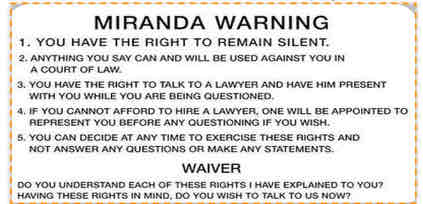AP Government - Civil Law Quiz Studying
1/26
Earn XP
Description and Tags
Based on the important vocabulary words for AP Government
Name | Mastery | Learn | Test | Matching | Spaced | Call with Kai |
|---|
No analytics yet
Send a link to your students to track their progress
27 Terms
Search Warrant
An order from a judge authorizing the search of a place; must describe what is to be searched and seized and is issued only after a judge is convinced by police that probable cause exists to believe that a crime has been committed and that evidence bearing on the crime will be found at a certain location.
Exclusionary Rule
Rule that evidence, no matter how incriminating, can’t be used in court if it was illegally obtained
Good Faith Exception
Evidence can be used if the police who seized it mistakenly thought they were operating under a constitutionally valid warrant
Plain View Doctrine
Allows an officer to seize (sans warrant ) evidence and contraband found in plain view during a lawful observation
Exigent Circumstances
In an emergency situation, or while in “hot pursuit”, the police do not need a warrant to enter
Self-Incrimination
“No person shall be compelled in any criminal case to be a witness against himself”
Miranda v. Arizona
This SCOTUS decision forced law enforcement officials to advise a suspect interrogated in custody of their rights to remain silent (5th, 14th) and their right to an attorney (6th and 14th).

Writ of Habeas Corpus
Arrested suspect brought before a judge to be formally charged with a crime
Indictment
formal accusation to bring accused to trial
Information
sworn statement by the prosecution asserting that there is sufficient evidence to go to trial
Plea-Bargaining
Defendant pleads guilty and accepts less severe punishment
Arraignment
judge reads formal charges against defendant in an open court room
6th Amendment
It guarantees the right to a fair and speedy trial by an impartial jury, the right to confront witnesses, and the right to legal representation.
Petit Jury
Group of citizens who hear evidence during trial in order to decide if the defendant is guilty or not guilty.
Burden of Proof
A legal standard that requires parties to provide evidence to demonstrate that a claim is valid.
Subpoena
written document requesting testimony from witness or face punishment
Acquittal
a judgment that a person is not guilty of the crime with which the person has been charged.
Beyond a Reasonable Doubt
This means that the prosecution must convince the jury that there is no other reasonable explanation that can come from the evidence presented at trial. In other words, the jury must be virtually certain of the defendant's guilt in order to render a guilty verdict.
Hung Jury
one that is unable to reach a verdict by the required voting margin. Often results in a retrial of the case.
Sentence
Punishment to be imposed on offender (defendant) when the verdict is guilty
Probation
Convicted person is not put in prison but has to live by certain rules under close monitoring
Restitution
Monetary fine or community service
Incarceration
Length of time in prison & option for parole
Capital Punishment
Death Penalty
Zero Tolerance Rule
Mandatory sentence
Three Strikes Rule
25 years to life (after 3rd felony conviction)
5th Amendment
Amendment that protects against self-incrimination, double jeopardy, and ensures due process of law, including the right to remain silent and not testify against oneself.